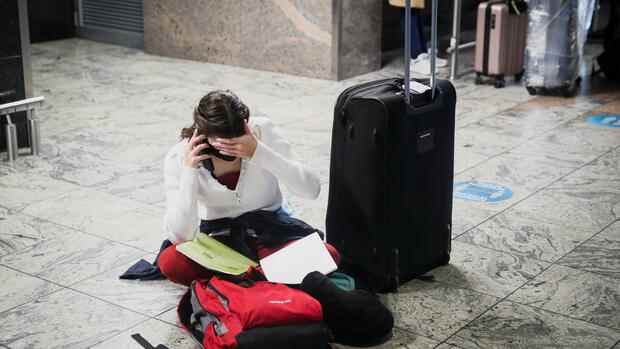A traveler desperately tries to get another flight home.
(Photo: Reuters)
Cape Town For South Africa it is a special kind of déjà vu. Only a year ago researchers at the Cape had also discovered a supposedly highly dangerous corona mutant, which was later called Beta. As it is now, South Africa was largely cut off from international air traffic shortly before its lucrative summer season from Christmas to Easter – with devastating consequences for tourism and its economy.
Beta was replaced by the much more dangerous Delta variant in India, but the damage was done: South Africa was only removed from the federal government’s list of virus variants in the middle of the year, which made traveling to the Cape extremely difficult.
Now that South African experts have discovered the Omicron variant, South Africa has once again been classified as a virus variant area and has been placed on the international index. Many governments have isolated South Africa and the southern continent virtually overnight. The summer season on the Cape is lost again – and large parts of its tourism are now possibly irretrievably lost.
So far, only comparatively few cases of the new mutation are known. This is also because the numbers on the Cape were extremely low until two weeks ago. However, there are now quite clear indications of a greater increase in infections in the greater Johannesburg / Pretoria area (Gauteng province), the country’s economic center. However, it is not yet certain whether the majority of these are related to the new mutant or whether they are just ushering in a new corona wave at the Cape.
Top jobs of the day
Find the best jobs now and
be notified by email.
Almost 2,200 cases had been registered in Gauteng on Friday – compared to less than 3,000 cases nationwide. As a result of the global panic, the Johannesburg stock exchange also lost ground on Friday – at 2.75 percent, however, less than the Dax. The South African currency, the rand, also posted larger losses, down 2.8 percent, but had gained almost 20 percent against the euro in the past 15 months and was considered overvalued by experts.
No serious illnesses so far
In South Africa, the government and business reacted in horror to the sudden and extensive isolation of their country and eight other neighboring states. Above all, many South Africans are angry that their country is being punished for its extraordinary ability and openness to quickly detect and report new virus variants.
One of these experts is Professor Tulio de Oliveira, head of the South African genome research institute Krisp, who was the first to warn of the new variant on Twitter last week without consulting the WHO. Within a few minutes, the stock exchange prices began to move around the world – and South Africa became the focus of the world. De Oliveira is now being accused by some of almost single-handedly ruining South Africa’s holiday season. One should take his cell phone away from the man, mocked the well-known commentator Peter Bruce in the Johannesburg “Sunday Times”.
The spread of the Omikron variant is to be tracked with the help of PCR tests.
(Photo: Reuters)
The news that none of the people in South Africa who had been infected with the new coronavirus variant so far had not been seriously ill had contributed to a slight calming of the situation. The chairwoman of the South African Medical Association, Angélique Coetzee, told the BBC that the cases identified so far in her country were not serious. In general, the investigations into the new variant are still at a very early stage.
Wolfgang Preiser, a German virologist at the University of Stellenbosch, pointed out that the Cape is currently researching the clinical course and effectiveness of antibodies against the virus. According to experts, it will take three to four weeks before scientists have a sufficiently good understanding of the effects of the new variant.
Despite all the outrage about the country’s isolation, Omikron is also taken extremely seriously in South Africa. On Saturday, President Cyril Ramaphosa had called a meeting of his “National Coronavirus Command Council” to evaluate the development of the mutant and possibly to increase the lockdown level, which is currently at its lowest level. In South Africa itself, only around 24 percent of people are currently fully vaccinated. About 35 percent have a primary vaccination.
More: The number of Omicron cases in Europe is growing – this is how dangerous the new virus variant is
